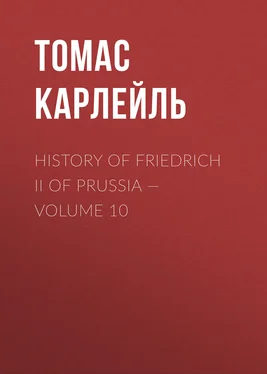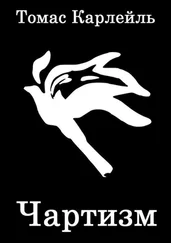Томас Карлейль - History of Friedrich II of Prussia — Volume 10
Здесь есть возможность читать онлайн «Томас Карлейль - History of Friedrich II of Prussia — Volume 10» — ознакомительный отрывок электронной книги совершенно бесплатно, а после прочтения отрывка купить полную версию. В некоторых случаях можно слушать аудио, скачать через торрент в формате fb2 и присутствует краткое содержание. Жанр: foreign_prose, История, literature_19, foreign_edu, foreign_antique, на английском языке. Описание произведения, (предисловие) а так же отзывы посетителей доступны на портале библиотеки ЛибКат.
- Название:History of Friedrich II of Prussia — Volume 10
- Автор:
- Жанр:
- Год:неизвестен
- ISBN:нет данных
- Рейтинг книги:4 / 5. Голосов: 1
-
Избранное:Добавить в избранное
- Отзывы:
-
Ваша оценка:
- 80
- 1
- 2
- 3
- 4
- 5
History of Friedrich II of Prussia — Volume 10: краткое содержание, описание и аннотация
Предлагаем к чтению аннотацию, описание, краткое содержание или предисловие (зависит от того, что написал сам автор книги «History of Friedrich II of Prussia — Volume 10»). Если вы не нашли необходимую информацию о книге — напишите в комментариях, мы постараемся отыскать её.
History of Friedrich II of Prussia — Volume 10 — читать онлайн ознакомительный отрывок
Ниже представлен текст книги, разбитый по страницам. Система сохранения места последней прочитанной страницы, позволяет с удобством читать онлайн бесплатно книгу «History of Friedrich II of Prussia — Volume 10», без необходимости каждый раз заново искать на чём Вы остановились. Поставьте закладку, и сможете в любой момент перейти на страницу, на которой закончили чтение.
Интервал:
Закладка:
There are Lists given us of the Prince's "Court" at Reinsberg; and one reads, and again reads, the dreariest unmemorable accounts of them; but cannot, with all one's industry, attain any definite understanding of what they were employed in, day after day, at Reinsberg:—still more are their salaries and maintenance a mystery to us, in that frugal establishment. There is Wolden for Hofmarschall, our old Custrin friend; there is Colonel Senning, old Marlborough Colonel with the wooden leg, who taught Friedrich his drillings and artillery-practices in boyhood, a fine sagacious old gentleman this latter. There is a M. Jordan, Ex-Preacher, an ingenious Prussian-Frenchman, still young, who acts as "Reader and Librarian;" of whom we shall hear a good deal more. "Intendant" is Captain (Ex-Captain) Knobelsdorf; a very sensible accomplished man, whom we saw once at Baireuth; who has been to Italy since, and is now returned with beautiful talents for Architecture: it is he that now undertakes the completing of Reinsberg, [Hennert, p. 29.] which he will skilfully accomplish in the course of the next three years. Twenty Musicians on wind or string; Painters, Antoine Pesne but one of them; Sculptors, Glume and others of eminence; and Hof-Cavaliers, to we know not what extent:—how was such a Court kept up, in harmonious free dignity, and no halt in its finances, or mean pinch of any kind visible? The Prince did get in debt; but not deep, and it was mainly for the tall recruits he had to purchase. His money-accounts are by no means fully known to me: but I should question if his expenditure (such is my guess) ever reached 3,000 pounds a year; and am obliged to reflect more and more, as the ancient Cato did, what an admirable revenue frugality is!
Many of the Cavaliers, I find, for one thing, were of the Regiment Goltz; that was one evident economy. "Rittmeister van Chasot," as the Books call him: readers saw that Chasot flying to Prince Eugene, and know him since the Siege of Philipsburg. He is not yet Rittmeister, or Captain of Horse, as he became; but is of the Ruppin Garrison; Hof-Cavalier; "attended Friedrich on his late Prussian journey;" and is much a favorite, when he can be spared from Ruppin. Captain Wylich, afterwards a General of mark; the Lieutenant Buddenbrock who did the parson-charivari at Ruppin, but is now reformed from those practices: all these are of Goltz. Colonel Keyserling, not of Goltz, nor in active military duty here, is a friend of very old standing; was officially named as "Companion" to the Prince, a long while back; and got into trouble on his account in the disastrous Ante-Custrin or Flight Epoch: one of the Prince's first acts, when he got pardoned after Custrin, was to beg for the pardon of this Keyserling; and now he has him here, and is very fond of him. A Courlander, of good family, this Keyserling; of good gifts too,—which, it was once thought, would be practically sublime; for he carried off all manner of college prizes, and was the Admirable-Crichton of Konigsberg University and the Graduates there. But in the end they proved to be gifts of the vocal sort rather: and have led only to what we see. A man, I should guess, rather of buoyant vivacity than of depth or strength in intellect or otherwise. Excessively buoyant, ingenious; full of wit, kindly exuberance; a loyal-hearted, gay-tempered man, and much a favorite in society as well as with the Prince. If we were to dwell on Reinsberg, Keyserling would come prominently forward.
Major van Stille, ultimately Major-General von Stille, I should also mention: near twenty years older than the Prince; a wise thoughtful soldier (went, by permission, to the Siege of Dantzig lately, to improve himself); a man capable of rugged service, when the time comes. His military writings were once in considerable esteem with professional men; and still impress a lay reader with favorable notions towards Stille, as a man of real worth and sense. [ Campagnes du Roi de Prusse; —a posthumous Book; ANTERIOR to the Seven-Years War.]
OF MONSIEUR JORDAN AND THE LITERARY SET
There is, of course, a Chaplain in the Establishment: a Reverend "M. Deschamps;" who preaches to them all,—in French no doubt. Friedrich never hears Deschamps: Friedrich is always over at Ruppin on Sundays; and there "himself reads a sermon to the Garrison," as part of the day's duties. Reads finely, in a melodious feeling manner, says Formey, who can judge: "even in his old days, he would incidentally," when some Emeritus Parson, like Formey, chanced to be with him, "roll out choice passages from Bossuet, from Massillon," in a voice and with a look, which would have been perfection in the pulpit, thinks Formey. [ Souvenirs d'un Citoyen (2de edition, Paris, 1797), i. 37.]
M. Jordan, though he was called "LECTEUR (Reader)," did not read to him, I can perceive; but took charge of the Books; busied himself honestly to be useful in all manner of literary or quasi-literary ways. He was, as his name indicates, from the French-refugee department; a recent acquisition, much valued at Reinsberg. As he makes a figure afterwards, we had better mark him a little.
Jordan's parents were wealthy religious persons, in trade at Berlin; this Jordan (Charles Etienne, age now thirty-six) was their eldest son. It seems they had destined him from birth, consulting their own pious feelings merely, to be a Preacher of the Gospel; the other sons, all of them reckoned clever too, were brought up to secular employments. And preach he, this poor Charles Etienne, accordingly did; what best Gospel he had; in an honest manner, all say,—though never with other than a kind of reluctance on the part of Nature, forced out of her course. He had wedded, been clergyman in two successive country places; when his wife died, leaving him one little daughter, and a heart much overset by that event. Friends, wealthy Brothers probably, had pushed him out into the free air, in these circumstances: "Take a Tour; Holland, England; feel the winds blowing, see the sun shining, as in times past: it will do you good!"
Jordan, in the course of his Tour, came to composure on several points. He found that, by frugality, by wise management of some peculium already his, his little Daughter and he might have quietness at Berlin, and the necessary food and raiment;—and, on the whole, that he would altogether cease preaching, and settle down there, among his Books, in a frugal manner. Which he did;—and was living so, when the Prince, searching for that kind of person, got tidings of him. And here he is at Reinsberg; bustling about, in a brisk, modestly frank and cheerful manner: well liked by everybody; by his Master very well and ever better, who grew into real regard, esteem and even friendship for him, and has much Correspondence, of a freer kind than is common to him, with little Jordan, so long as they lived together. Jordan's death, ten years hence, was probably the one considerable pain he had ever given his neighbors, in this the ultimate section of his life.
I find him described, at Reinsberg, as a small nimble figure, of Southern-French aspect; black, uncommonly bright eyes; and a general aspect of adroitness, modesty, sense, sincerity; good prognostics, which on acquaintance with the man were pleasantly fulfilled.
For the sake of these considerations, I fished out, from the Old-Book Catalogues and sea of forgetfulness, some of the poor Books he wrote; especially a Voyage Litteraire, [ Histoire d'un Voyage Litteraire fait, en MDCCXXXIII., en France, en Angleterre et en Hollande (2de edition, a La Haye, 1736).] Journal of that first Sanitary Excursion or Tour he took, to get the clouds blown from his mind. A LITERARY VOYAGE which awakens a kind of tragic feeling; being itself dead, and treating of matters which are all gone dead. So many immortal writers, Dutch chiefly, whom Jordan is enabled to report as having effloresced, or being soon to effloresce, in such and such forms, of Books important to be learned: leafy, blossomy Forest of Literature, waving glorious in the then sunlight to Jordan;—and it lies all now, to Jordan and us, not withered only, but abolished; compressed into a film of indiscriminate PEAT. Consider what that peat is made of, O celebrated or uncelebrated reader, and take a moral from Jordan's Book! Other merit, except indeed clearness and commendable brevity, the Voyage Litteraire or other little Books of Jordan's have not now. A few of his Letters to Friedrich, which exist, are the only writings with the least life left in them, and this an accidental life, not momentous to him or us. Dryasdust informs me, "Abbe Jordan, alone of the Crown-Prince's cavaliers, sleeps in the Town of Reinsberg, not in the Schloss:" and if I ask, Why?—there is no answer. Probably his poor little Daughterkin was beside him there?—
Читать дальшеИнтервал:
Закладка:
Похожие книги на «History of Friedrich II of Prussia — Volume 10»
Представляем Вашему вниманию похожие книги на «History of Friedrich II of Prussia — Volume 10» списком для выбора. Мы отобрали схожую по названию и смыслу литературу в надежде предоставить читателям больше вариантов отыскать новые, интересные, ещё непрочитанные произведения.
Обсуждение, отзывы о книге «History of Friedrich II of Prussia — Volume 10» и просто собственные мнения читателей. Оставьте ваши комментарии, напишите, что Вы думаете о произведении, его смысле или главных героях. Укажите что конкретно понравилось, а что нет, и почему Вы так считаете.









